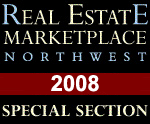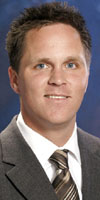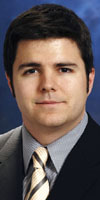
Surveys
DJC.COM
December 11, 2008
Young guns take their shot at the market
For CBA

Travers
|
If you look back at the cyclical nature of the commercial real estate business, or if you have read any recent headlines, you know the market is entering a downturn. This is not anything professionals in the industry haven’t seen and lived through before. That is unless you started in the business within the last five years, arguably the most active the Puget Sound commercial market has ever seen.
Armed with the experience gained at the height of the market and the water cooler history lessons of the past, the younger generation stands fit to fight the battle of longevity in an industry where few last long. I set about talking to three up-and-comers from CB Richard Ellis about their experiences and this is what they had to say:
MATT O’BRIEN
Senior Associate, Industrial Specialist
We’re in a great business. Although we work for a big company, we’re really our own CEOs. We can choose who to work with and what to work on; we have freedom and flexibility in our work schedules and we have the ability to make a considerable amount of money.
I think a lot of people outside the industry look at us and think we’re handed a great career by our managers or the senior people in the company. What they don’t realize is the amount of blood, sweat and tears it takes to get our respective “corporation” up and running.
For most of us, the beginning of our career consists of being handed a phone, a list of company names and numbers, some casual advice, and a bunch of “good luck, kid” comments from professionals that know the odds of us succeeding are stacked against us.

O'Brien
|
The first year in the business is a combination of embarrassing foul ups, being hung up on, a few mild successes and a ton of horrific defeats. You quickly learn to have thick skin and the ones who can get back off the canvas quickly after being knocked down are the ones that make it to year two.
Year two is when you start figuring out if this business is right for you. By then, hopefully you’ve been able to put a deal or two together, handle difficult clients, and have started to earn the respect of the senior brokers around you who need your hard work and energy to help drive some of their business.
If you survive long enough to make it to your third year, you should be well on your way to a full-blown career. By now you’ve established exclusive clients and business lines, and have more or less figured out the art of the deal, although brokers never stop learning in this business.
We certainly have an advantage with technology. Having gone to school during the information age, we are able to take advantage of communication avenues that weren’t available to senior brokers when they started in the business. This allows us to use our time efficiently, and keep more balls in the air at one time.
That being said, the fundamentals of this business haven’t changed all that much. A face-to-face meeting, handshakes and developing strong business relationships are what will make you successful in this business. This is what draws alpha males and females to the business.
When I got started, a good family friend who has had a long, successful career in the business told me “good luck, keep your head down and enjoy it. It’s the greatest business in the world, and if everyone could do it, then everyone would.”
As I’ve grown up in the business, I’ve found myself using that exact line to the next generation of upstarters who are ready to try their hand at being their own CEO.
CAVAN O’KEEFE
Senior Associate, Office Specialist
When you think of young commercial brokers as “young guns,” you typically reference a combination of the movies “Wall Street” and “Top Gun” from the 1980s. From my standpoint, I think of commercial real estate as one of the last frontiers of pure entrepreneurial spirit in a corporate-driven work environment. Smaller cities like Seattle are no longer just “handshake” driven. It takes complex resources and solutions to solve simple problems.
International business, accounting standards, asset management pro-formas, financing, are just a few daily problems and key words which did not exist in our daily routine 10 to 20 years ago.

O'Keefe
|
The environment has changed, and so has the new crop of young brokers moving into the field. Having grown up in a background of real estate development, my interest has always been in making deals, and creating value for something. It did not matter if I was selling a ‘74 BMW 2002 I had restored in college, or negotiating a transaction between friends to go on a blind date. If I had not ground down the other party in the transaction and convinced them the logical path was the one I was proposing, I was a failure. This led to a solid basis for downtown office leasing, where complex solutions are required to combat constantly changing market conditions in a tech-driven city.
The office environment (especially with the recent changes at Washington Mutual and Wall Street) has turned towards fear and a market-wide question of where rents and occupancy are going to go next.
Logical decisions that appeared easy six months ago have turned troublesome and slow. Having the patience, staying power, and creative thought to make your clients happy and save them money has turned into an art form in recent years, and many young brokers are grasping this better than the previous generation.
Technology is a big factor in brokerage success, as the advent of e-mail and online transfer of information has increased at such a high rate and everyone has the opportunity to learn. The old guard who considered information to be king are still doing well, but those who have integrated technology into their daily practice to help disseminate information quicker and solve financial equations faster have really excelled.
As corporate responsibility has continued to be changed by the global economy, large and small companies are coming around to the fact that green is good. Not only LEED certification of potential buildings, but small green touches which save money on operating expenses (green roofs, onsite waste water treatment, recycled materials, solar energy, etc.), have become important considerations for landlords and tenants.
Part of the next real estate (commercial and residential) revolution will no doubt include components or architecture inspired by helping the environment. It may be a cycle or two before all corporations and companies are able to justify the expense of this commitment to a more green environment, but today younger real estate practitioners tend to be more in-tune with this future than the old timers.
As Seattle continues to rank among the top cities for commercial real estate in the world, young people will continue to try their hand at commercial real estate brokerage. The business is central to the texture and depth of any city, and my investment with it engages me with its people, its company, its character and its spirit.
With a keen eye on real estate and its architectural significance, the value of it in this city with our booming industries (Microsoft, Amazon, Boeing, etc.) and great philanthropic spirit, I will continue to push forward to improve Seattle as long as I can bear to work. There is always the next deal.
KELSEY SCHMIDT
Associate, Investment Sales
My role, as an investment properties specialist, is to offer comprehensive real estate services designed to provide the highest value to clients with the least amount of risk. A role not achieved in a day, a month or a year.

Schmidt
|
Most real estate professionals ease their way into investment sales after focusing for years on the leasing business. I jumped into the investment business day one and discovered it takes an incredible amount of time and commitment to fully understand the intricacies of the investment market and to cultivate relationships necessary to conduct business involving the sale of a portfolio, building, land, parking lot, etc. This may be part of the reason why full-time commercial real estate investment professionals have garnered the reputation of a rather small and elite group. It is not an easy club to crack and success can take years to achieve. Even with patience and hard work, this line of business has no guarantees.
In today’s marketplace there are numerous ways to stay ahead of the cutting edge of the business and rise above the pack. By leveraging modern technology, investment specialists have advanced the efficiencies of their business practices.
E-mail and the Internet allows information from every corner of the world to be available at our fingertips 24/7 and deals are literally struck in minutes. Sending a sales package via “snail mail” is ludicrous when e-mail takes seconds. Using a camera is unnecessary when you can take and send pictures of a potential investment using a cell phone. Newspapers are old news when headlines can be sent via text messaging as they happen.
It is important to note, however, that no amount of technology will ever replace the fact that the real estate brokerage business is relationship driven. An e-mail will never have the same impact as a handshake and eye contact. Whether you are a first-year broker or have been in the business 30-plus years, if you have a personal relationship with your client your chances of getting the business go up.
The seasoned veterans might have had more time to establish relationships, but the best part about this business is that you can walk in on day one and compete as long as you are able to create the relationship with the client and demonstrate that you deliver value. Your earnings and position within the company are in your own hands and your ultimate success is up to you. Of course, it takes a few tough years of grinding to get business rolling but the opportunity is always available for those who want to put in the necessary time and effort to succeed.
This is particularly critical in our shifting market. With so much uncertainty and turmoil, investors are looking to trusted advisers for direction on how to ride out the storm. The broker that is able to create a trusted relationship and provide relevant quality, timely information over the next few years of disorder will be the one that is rewarded when customers decide it is time to jump back in to the market. Calmer, proactive, forward-thinking heads will prevail. And we’ll be right there when they need them.
This business isn’t for everybody, but for me it has proven to be a perfect combination of risk and reward, work and fun, and challenge and success. That has convinced me that I have found my perfect career path.
Barbara Travers is a consultant to Northwest commercial real estate companies.
Other Stories:
- CBA speakers take on the economy
- A green future for savvy developers
- Making green design deliver ROI, not just LEED
- Market District evolves as a walkable neighborhood
- Mixed-use projects can pay off handsomely
- Local retailers will fare better than others
- Suburban hubs will draw tomorrow’s renters
- Seattle’s office market: No more high-fiving
- Industrial market hums along, but don’t hold your breath
- CBA ready to mint a new breed of green brokers
- Weathering the storm
- David A. Sabey
Sabey Corp. - Sean G. Hyatt
Trammell Crow Residential - Lynn Michaelis
Weyerhaeuser Co. - Dan Ivanoff
Schnitzer West - Commercial real estate prepares for the future
- The pitfalls of renting out condo projects
Copyright ©2009 Seattle Daily Journal and DJC.COM.
Comments? Questions? Contact us.